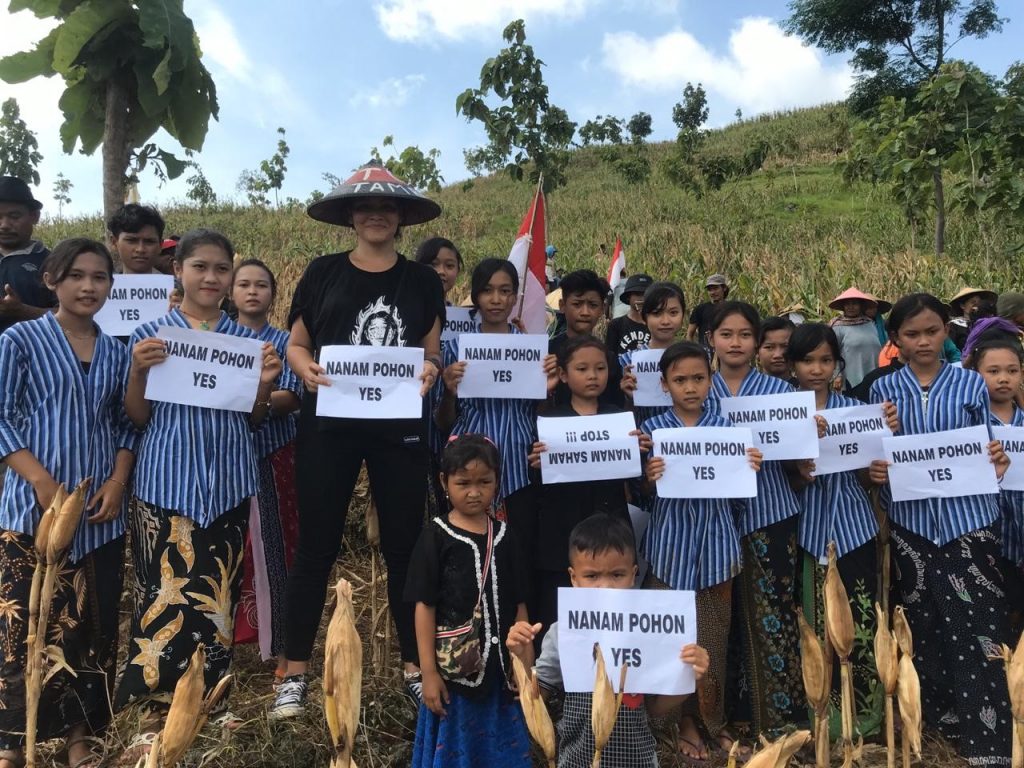
Pangkur
Nanduri panggonan bera // Dina iki barengan ditindhaki // Wujud tindakan lan laku // Kanggo ngomahi toya // Dimen sumber lestari nyukupi butuh // Kang mangkono anak putu // Tetep bisa den warisi //
(Let’s plant the vacant land, today we do it together. As a form of action and carry out. So that the spring has a house, to make ends meet. Thus, we hope our children and grandchildren. So that you can feel the legacy of the preservation of the spring)
A piece of the Javanese Pangkur song sung by residents who are members of the Kendeng Mountains Caring Community Network (JMPPK) during the activity “Nyawiji Nandur Kanggo Lestarine Kendeng” throughout January-February 2020. This activity, also known as “Planting Wednesday”, takes the form of joint tree planting which is routinely held every Wednesday morning in the Kendeng Utara Mountains area. At that time, all residents will gather at one point and then depart together in tandem, travel and climb the mountain to the location to be planted. Every month, the Wednesday Planting activity is carried out by inviting outsiders, which aims to expand awareness and build bonds of solidarity together.
Planting trees is the key to maintaining the balance of the ecosystem. By planting, water and springs can be saved and their habitat for biodiversity is preserved. “By planting together, humans have saved their own lives.” This was stated by a resident of Kendeng while carrying out the Wednesday Planting Action activity, on Wednesday (26/2), in Sukolilo District, Pati, Central Java.
This Wednesday Planting originated from the insistence of residents of the mountains of North Kendeng for the Pati District Government (Pemkab) to care about the importance of revitalizing the ecological function of the North Kendeng area. In a number of local media, the Pati Regency Government has scheduled the planting of 3 (three) million trees. However, it is not clear when and where the 3 (three) million trees will be planted. A number of women from North Kendeng then tried to ask the Regent of Pati on January 8, 2020. Unfortunately, they did not get a definite answer. In fact, the efforts of residents to ask the Regent are a form of desire to be actively involved in efforts to preserve the environment in the North Kendeng area. Finally, the residents took the initiative to plant trees without waiting for news from the Pati regency.
On the last Wednesday of February (26/02/2020), Wednesday Planting or “Nyawiji Nandur Kanggo Lestarine Kendeng” was closed with a series of tree planting events with musician Melanie Soebono followed by a gamelan collaboration performance “Wiji Kendeng feat Melanie Soebono” and a discussion about Revised Regional Regulation (Perda) on Spatial Planning (RTRW) in Omah Kendeng, Sukolilo, Pati, Central Java. The discussion presented the resource person, Dr. Mila Karmila, Academics from Unnisulla Semarang and Gunretno, Coordinator of JMPPK, and moderated by Aryanto Nugroho, Advocacy Manager of Publish What You Pay (PWYP) Indonesia.
Gunretno, conveyed the latest developments in the implementation of recommendations from the Strategic Environmental Assessment (KLHS) Kendeng Mountains which have not been fully implemented by the Regional Government. “In fact, KLHS is a mandate that was initiated directly by the President, as the Head of State. Then it should be done. “Gunretno explained.
On this occasion, Gunretno also explained that the Revision of the Pati Regency RTRW Regional Regulation, which is currently underway, needs to be guarded together. “KLHS Kendeng Mountains has mandated that the revision of the RTRW for Pati Regency must carry out a number of recommendations, including the Sulilo KBAK must be maintained; Mining Business Permits (IUP) in KBAK may not be extended; Kayen, Sukolilo and Tambakromo sub-districts are not allowed for mining and other areas.”
While Dr. Mila Karmila said, in every formulation of the RTRW Perda, the Regional Government must compile a RTRW KLHS. However, the KLHS RTRW for Pati Regency should be in line with the KLHS for the Kendeng Mountains that had been prepared previously. Even though the contents of KLHS are in the form of recommendations, this is an objective and comprehensive study, so it needs to be a major consideration for local governments in implementing future policies. (AA/AN)